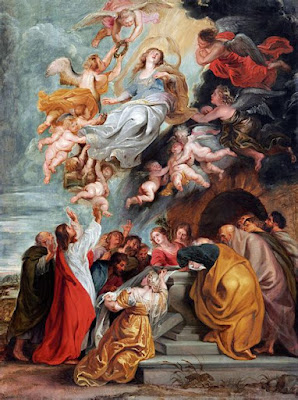Homily Notes: 08-15-21 - The Feast of the Assumption

"And behold all generations shall me blessed." Today we celebrate the beautiful feast of the Assumption. The Assumption is the culmination of Mary's earthly life, which began at her Immaculate Conception and finished here, at the Assumption. She continues to be an advocate in Heaven, showering graces upon us. What does this feast mean? What are we celebrating? Let’s pause today and see what it is that we truly celebrate and what it means for us. The Immaculate Conception is when we celebrate Mary’s conception in her mother’s womb, the womb of Ann, conceived without sin. Today, we celebrate Our Lady being taken up, body and soul, into heaven, being assumed by God into heaven. This is different from the Ascension of Jesus Christ where Jesus used his own divine power to ascend into heaven. He raised Himself at the Ascension, whereas the Assumption is God bringing Mary into heaven. It wasn’t by her own power, it ...





